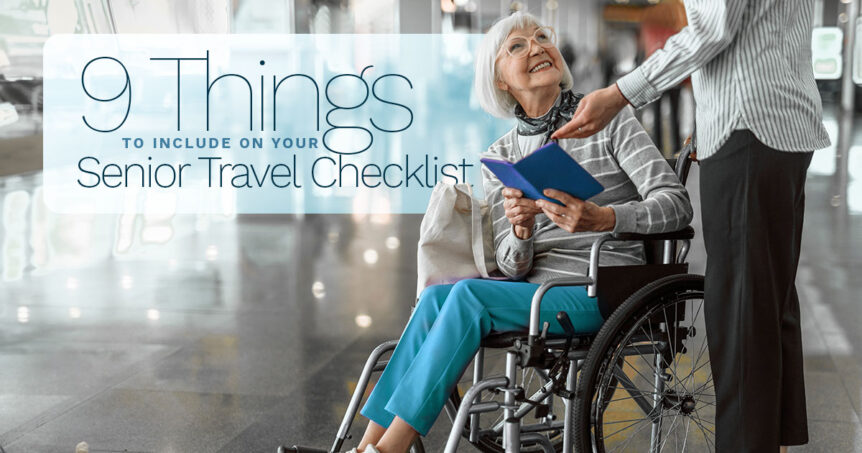Acting as a senior travel companion requires careful planning and consideration, especially when the journey involves expert medical care or senior relocation. Whether you’re accompanying an elderly parent, grandparent, or friend, this comprehensive guide will help ensure a smooth and comfortable travel experience. Through GOMO’s years of experience, we have compiled the following guide to help you assemble your own senior travel checklist.
Packing List
Start your preparation at least a week before departure by creating a detailed packing list. Beyond basic clothing and toiletries, seniors often need specific items for comfort. Pack loose-fitting clothes that are easy to put on and remove. Include a light blanket and neck pillow for temperature regulation and comfort during long flights. Don’t forget entertainment items like large-print books, puzzles, or a tablet loaded with favorite shows – these can help pass the time during delays or long journeys.
Develop a detailed packing strategy beyond standard travel items that include:
- Comfortable, loose-fitting clothing in layers
- Non-slip shoes with good support
- Personal hygiene items in travel sizes
- Familiar snacks and an empty water bottle
- Entertainment materials like large-print books
- Small pillow for support
- Hand sanitizer and masks
- Necessary medical equipment and backup batteries
Medications
Medication management is crucial when traveling with seniors. Create a detailed schedule of all prescriptions, including dosages and timing. Pack medications in their original containers with clear labels, and always carry them in carry-on luggage. Bring extra doses in case of delays, and keep a written list of all medications, including generic names in case replacements are needed. Consider time zone changes when planning medication schedules and consult with healthcare providers about any necessary adjustments.
Mobility Devices
If your senior companion uses mobility devices then thorough preparation is essential. For wheelchairs or walkers, check their condition before travel and consider bringing basic repair tools. Contact the airline about their policies regarding mobility devices and request wheelchair assistance at all airports even if your loved one can walk short distances – this can help prevent exhaustion during long terminal walks.
Incontinence Barriers
Though rarely discussed, managing incontinence during travel requires thoughtful planning. Pack extra incontinence supplies in both carry-on and checked luggage. Include disposal bags, wet wipes, and a change of clothes in your carry-on. Research restroom locations along your route, including during layovers, and consider requesting an aisle seat near bathrooms on flights.
Personal Identification
Keep all important documents organized and easily accessible. Beyond standard identification, carry copies of medical insurance cards, physician contact information, and any relevant medical history. For international travel, bring multiple copies of passports and keep digital copies stored securely. Consider medical alert jewelry if appropriate and ensure all identification is current and won’t expire during travel.
Pre-Flight Coordination with Airline
Many airlines offer special services for elderly passengers but these often require advance notice. Contact the airline at least 48 hours before departure to arrange assistance. Request special meals if needed, discuss any medical equipment that needs to be carried onboard, and ask about policies regarding priority boarding. Some airlines also offer escort services through security and to gates.
Compression Stockings
Long periods of sitting during travel can increase the risk of blood clots, particularly in seniors. Invest in properly fitted compression stockings and ensure the traveler wears them during travel. Help them put the stockings on before the journey begins, and encourage regular leg exercises and movement when possible. For flights longer than four hours, schedule walk breaks if medical conditions permit.
Contingency Plans
Travel often comes with unexpected delays and disruptions. Having contingency plans in place can make a world of difference when traveling with a senior. Prepare for unexpected situations by developing backup plans like the following:
- Prepare for unexpected situations by developing backup plans.
- Research medical facilities near your destination and along your route.
- Keep a list of pharmacies that can access electronic prescriptions.
- Consider travel insurance that covers medical emergencies and trip cancellations.
- Have a plan for what to do if flights are canceled or if your companion becomes ill during travel.
Emergency Contact List
Before you leave, create a comprehensive contact list including family members, physicians, insurance providers, and embassy information for international travel. It’s important to print multiple copies and keep them in different locations. Be sure that any list includes cell phone numbers, email addresses, and any relevant account numbers. It’s also a good idea to share this list with key family members who are not traveling with you and consider creating a digital version that can be accessed securely online.
Remember, successful travel with seniors is all about anticipating needs and being prepared for various scenarios. While this senior travel checklist may seem overwhelming at first, having these elements in place will help ensure a safer, more comfortable journey for your elderly companion. Take time to review and customize these suggestions based on your specific situation, and don’t hesitate to contact GOMO Travel when your loved ones require the very best medical travel companions in the world.
